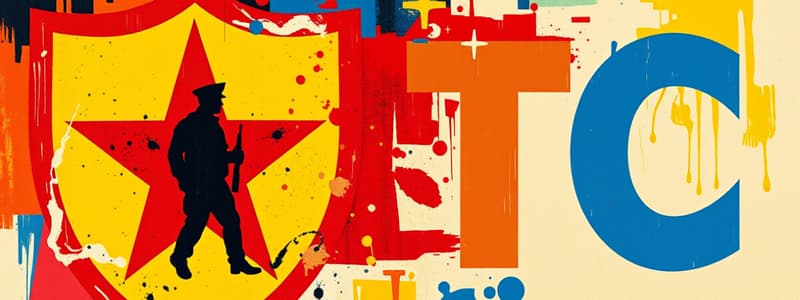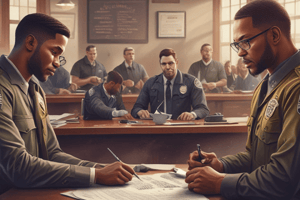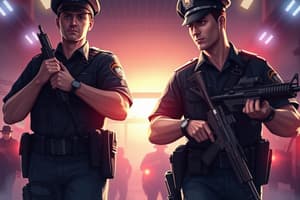Podcast
Questions and Answers
What is the CJTC Mission Statement focused on?
What is the CJTC Mission Statement focused on?
- Increasing law enforcement budgets
- Enhancing public safety (correct)
- Decreasing crime rates through technology
- Promoting community activities
Which of the following are primary patrolling objectives? (Select all that apply)
Which of the following are primary patrolling objectives? (Select all that apply)
- Steal property
- Crime prevention (correct)
- Arrest (correct)
- Protect and serve (correct)
What are the protect and serve priorities?
What are the protect and serve priorities?
Ourselves and other officers, victims, citizens, suspects, property
What drives crime according to the crime prevention definition?
What drives crime according to the crime prevention definition?
What does preserving the peace ensure?
What does preserving the peace ensure?
What is the mission of enforcing all laws?
What is the mission of enforcing all laws?
What is the mission of arresting individuals?
What is the mission of arresting individuals?
The four C's of call response are: Communicate, Coordinate, Command, and _____
The four C's of call response are: Communicate, Coordinate, Command, and _____
What are the seven fatal tendencies in law enforcement?
What are the seven fatal tendencies in law enforcement?
What are the ten deadly errors made by law enforcement?
What are the ten deadly errors made by law enforcement?
What does substantive law establish?
What does substantive law establish?
What does procedural law establish?
What does procedural law establish?
What is the significance of criminal procedures?
What is the significance of criminal procedures?
Which of the following are sources of criminal procedure? (Select all that apply)
Which of the following are sources of criminal procedure? (Select all that apply)
There is absolute immunity protection for law enforcement.
There is absolute immunity protection for law enforcement.
What types of sanctions can be enforced on law enforcement? (Select all that apply)
What types of sanctions can be enforced on law enforcement? (Select all that apply)
What causes liability in law enforcement?
What causes liability in law enforcement?
What are events that can trigger officers to be sued?
What are events that can trigger officers to be sued?
What are events that can trigger law enforcement agencies to be sued?
What are events that can trigger law enforcement agencies to be sued?
What are the parts of the Constitution? (Select all that apply)
What are the parts of the Constitution? (Select all that apply)
What does the executive branch do?
What does the executive branch do?
What does the judicial branch do?
What does the judicial branch do?
What does the legislative branch do?
What does the legislative branch do?
What rights are protected by the First Amendment?
What rights are protected by the First Amendment?
What does the Second Amendment address?
What does the Second Amendment address?
What is stated in the Third Amendment?
What is stated in the Third Amendment?
What is the Fourth Amendment focused on?
What is the Fourth Amendment focused on?
Flashcards are hidden until you start studying
Study Notes
CJTC Mission Statement
- Enhances public safety in Washington State.
- Establishes high standards and training for criminal justice professionals.
- Ensures knowledge and skills to protect life, liberty, and property.
Five Primary Patrolling Objectives
- Protect and serve.
- Prevent crime actively.
- Preserve peace.
- Enforce all laws consistently.
- Conduct arrests when necessary.
Protect and Serve Priorities
- Priority is for oneself and fellow officers.
- Ensures safety of victims and citizens.
- Addresses suspects and protects property.
Crime Prevention
- Crime driven by opportunity, desire, and ability.
- Law enforcement impacts opportunity and ability through presence.
Preserve the Peace
- Upholds constitutional rights of the public.
- Protects lives and property of individuals.
Enforce All Laws
- Regulates public conduct.
- Aims to protect individuals from themselves and others.
Arrest
- Removes individuals who threaten community safety.
Four C's Call Response
- Framework for responding to calls: Communicate, Coordinate, Command, Control.
Seven Fatal Tendencies
- Imbalanced public relations and service orientation.
- Use less force than peers.
- Delay in using force compared to peers.
- Shortcutting rules and procedures.
- Acting without waiting for backup.
- Over-reliance on reading people's behaviors.
- Dropping guard when circumstances appear safe.
Ten Deadly Errors Made by Law Enforcement
- Failing to observe offenders' hands.
- General apathy towards suspects.
- Lack of adequate rest.
- Displaying tombstone courage.
- Preoccupation with other matters.
- Missing danger signs during encounters.
- Taking unfavorable positions during confrontations.
- Relaxing too soon in non-threatening situations.
- Improper searches or handcuff use.
- Inadequate weapon, vehicle, or equipment proficiency.
Substantive Law
- Comprises legislated acts defining crime elements.
- Establishes necessary act and mental state to commit a crime.
Procedural Law
- Regulates procedures in governmental affairs.
- Governed by legislated acts.
Significance of Criminal Procedures
- Protects citizens' rights.
- Aids in successful prosecutions.
- Reduces criminal and civil liability for officers.
- Minimizes internal disciplinary issues.
- Fosters public cooperation during critical situations.
Sources of Criminal Procedure
- Constitutional documents.
- Revised Code of Washington (RCW).
- Washington State court rules.
- Court rulings from state and federal courts.
- Agency policies and common law.
Law Enforcement Liability and Sanctions
- No absolute immunity protection.
- Qualified or good faith immunity may apply; limited immunity must be claimed.
Sanctions Enforceable on Law Enforcement
- Criminal liability.
- Civil liability.
- Departmental liability.
Liability Arises From
- Police negligence.
Events Triggering Lawsuits Against Officers
- Use of excessive force.
- Negligent driving incidents.
- Mistakenly entering the wrong property.
- Wrongful arrests, whether correct or incorrect.
- K-9 unit dog bites and harassment claims.
Events Triggering Lawsuits Against Agencies
- Negligent hiring and retention practices.
- Failure to provide adequate training and supervision.
- Allowing or condoning misconduct such as harassment.
- Inequitable treatment of employees.
Parts of the Constitution
- The preamble outlines foundational intentions.
- Articles of incorporation provide structural governance.
- The Bill of Rights safeguards individual liberties.
Executive Branch
- Composed of the President and cabinet departments.
- Responsible for enforcing laws.
Judicial Branch
- Includes the Supreme Court and lower courts.
- Interprets laws to ensure justice.
Legislative Branch
- Comprised of the House and Senate.
- Responsible for law-making activities.
First Amendment
- Guarantees freedoms of speech, press, and religion.
- Protects right to assemble peacefully and petition government.
Second Amendment
- Secures individuals' right to bear arms.
Third Amendment
- Prohibits soldiers from occupying private homes without consent.
Fourth Amendment
- Protects against unreasonable searches and seizures.
- Warrants require probable cause for issuance.
Studying That Suits You
Use AI to generate personalized quizzes and flashcards to suit your learning preferences.



